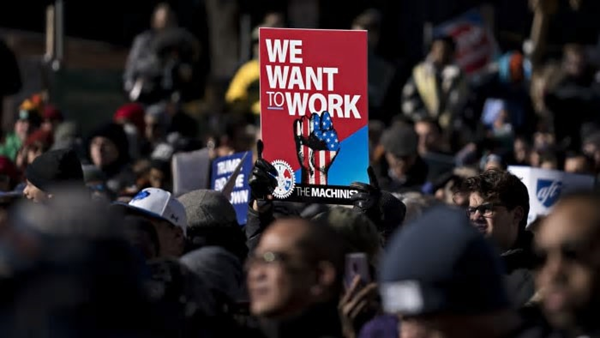|
|
Opinion
Corporate governance
Workers must be at the heart of company
priorities
A judge’s manifesto for fairer
and more sustainable capitalism
Leo Strine
|
|

A rally to end the
partial US government shutdown in January. US workers are more
skilled than ever but share less and less in corporate profits ©
Bloomberg
|
Leo
Strine
[OCTOBER 1, 2019]
The US corporate governance system has
lost sight of its purpose. Companies have become more responsive to
the immediate desires of the stock market but are failing to move
quickly toward sustainable business practices, adequately invest in
human capital and, most importantly, fairly share gains from corporate
profits with the workers who create them.
The disjunction comes at a time when
many American workers have become forced capitalists. Tax rules demand
that employees saving for retirement or education put their money into
equity and bond mutual funds in 401(k) and 529 plans.
These long-term savings objectives
should align well with running sustainable, responsible businesses.
Diversified worker-investors do not benefit when some companies
offload the costs of their activities, such as pollution and carbon
emissions, on to everyone else. As human beings who consume products,
and depend on good jobs, they suffer when companies harm the
environment, defraud or injure consumers and move production overseas.
Critically, 99 per cent of Americans owe
most of their wealth to their jobs. As a result, the vast majority of
investors need companies to do business in a way that provides
Americans with access to good jobs, sustainable wage growth and a fair
share of the profits that businesses generate. Yet our corporate
governance system has increasingly failed to deliver. From the late
1940s to the early 1970s, workers and investors did share in the
wealth generated by a strong, growing economy. But since then that
social compact has frayed: worker productivity has risen
by about 70 per
cent, but hourly pay has grown by only 12 per cent. Meanwhile,
corporate profits have hit
record highs. US workers are
more educated, more skilled and do more to create corporate
profits, but they share far less in the fruits of that labour.
The Business Roundtable, made up of top
chief executives and institutional investors such as Vanguard and
BlackRock now
acknowledge that we need to make our capitalist system work better
for the many. But scepticism rightly exists over whether this woke
talk will be backed up by real action. Here are some concrete steps
that could make a difference.
Workers must be given far more priority
by companies. We should appoint board committees focused on fair
treatment of company employees and those who work for its
subcontractors. Business leaders must also support sensible labour law
reforms giving unions a fairer opportunity to represent and bargain
for their workers. We must make it easier to hold companies
accountable by requiring better disclosure of how they treat workers
and whether they operate in an ethical, sustainable, environmentally
responsible manner.
But companies cannot act more
responsibly without the support of the institutional investors who
control worker-investors’ capital and thus of corporate shares. Some big
money managers are starting to consider environmental, social, and
governance factors. That is not enough. Institutional investors should
be focused on EESG, adding an “E” for the interests of company
employees. They should align their voting policies with the interests
of worker-investors who need not just sustainable corporate profits
but also good jobs, clean air and safe products. It makes no sense to
require companies to disclose their EESG performance unless
institutional investors also have to do so.
Other complementary measures are needed
to promote a fair and sustainable capitalism. We must change tax and
accounting rules that encourage speculation and rapid portfolio
turnover, rather than productive, sound, long-term investments.
Investments in employees should get as much credit as investments in
robots. A financial transactions tax, capital gains tax reform, and
elimination of rules that reduce the tax rate on “carried interest”
generated by private equity would all increase the fairness of our tax
system and discourage socially unproductive speculation.
The resulting revenues should fund
infrastructure and basic research to improve US competitiveness and
quality of life. We can supercharge our efforts to address climate
change and set a global example. Investing in research, infrastructure
and training will create jobs in the US, help workers in
carbon-intensive industries shift to emerging clean energy companies,
spark innovation and enhance America’s long-term international
competitiveness.
US public corporations are not
playthings. They create jobs, produce goods and services that
consumers depend on, affect the environment we live in and build
wealth that help Americans lead more secure lives. They are societally
chartered institutions of enormous importance and value. Those who
govern them should be accountable for the generation of durable wealth
for their workers and ordinary investors.
We need a new system that supports
sustainable and fair wealth creation within a system of enlightened
capitalism. It should align the interests of institutional investors
and corporations with those of the workers whose capital they control.
With some modest sacrifices by every interest that wields economic
power, we can make the economy work better for all Americans.
The writer is chief justice of the
Delaware Supreme Court and author of ‘Toward Fair and Sustainable
Capitalism’, prepared for this week’s
‘A New Deal’ conference in Washington
|
© THE
FINANCIAL TIMES LTD 2019. |
|
